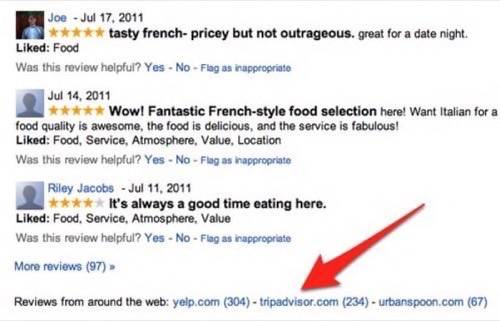Updated with comment from Google below. This was probably something you could see coming: Google Places, the search giant’s relatively new play in local search and reviews, today announced that it has revamped Place pages and removed excerpts from reviews on 3rd party services.

For now, sites like Yelp, TripAdvisor, JudysBook or Europe’s Qype will be linked-to at the bottom of a list of Google Places reviews. (Sometimes they appear at the top.) This seems to me like the kind of thing that could be discussed in an examination of potentially monopolistic business practices. Independent review sites have had to know, though, that the company that delivered them up in search results for so long would be tempted to just create its own content and keep review searchers on Google’s own sites. Google Places is a very compelling service for users, too.
Maybe it’ll be ok; maybe a lot of people will click through and visit other local review sites, still. I know I sometimes start at Google Places to check open and closing times for restaurants and then go to Yelp for more reviews. For how long will Yelp have more reviews though, if all paths through Google lead first and foremost to more Google?
Google says that in the long run, it hopes to make writing and posting reviews even faster and easier (it’s quite easy already, the Google Places iPhone app for example is a model of usability), it hopes to take those Google Places reviews and display them all over the rest of Google sites and services where they might be useful and it hopes to serve up more personalized content – like reviews of places written by people you know. Perhaps people in your “inner Circles?”

There are a lot of different ways to look at this change, including from the perspective of small businesspeople and the tech consultants that serve them.
“Jeez – Can’t these guys knock it off with the changes already?” asked Search Engine Consultant Dev Basu today in comments on a hotly discussed post by Google Maps and Search consultant Mike Blumenthal. “I spent the better half of last year educating clients in hotel and hospitality verticals to not put all their eggs in Google reviews. Instead, we decided to run Yelp, Tripadvisor, and Hotels.com programs to incent reviews.”
Blumenthal argued, though, that Google still links to other review sites and presumably will still surface them in search. Thus he argues that the best practice for local businesses remain the same: to cultivate reviews on 3 independent sites in addition to Google Places.
We’ll see how things look in the future. Google Places is a great service, but competition between multiple innovators is ultimately better.
Update: A Google spokesperson emailed to provide the following feedback (sometimes they are very nice, I swear) “the headline, second paragraph and overall suggestion about why we made today’s changes is inaccurate.
“This line from our LatLong blog post is most instructive:
“Based on careful thought about the future direction of Place pages, and feedback we’ve heard over the past few months, review snippets from other web sources have now been removed from Place pages.
“If you could please update your post to reflect this sentiment, that’d be much appreciated.”
If you can explain to me the substantive difference between that and what I did say, please let me know in comments below and include your mailing adress. I will send you a big cookie. So goes it, sometimes.
So, readers, apparently Google would like you to know that they did not put excerpts from their own reviews on Places pages, remove excerpts from other sites’ reviews and leave only one line of links to 3rd party sites because they wanted visitors to remain on Google sites instead of going elsewhere. Regardless of the intention, I suspect you’ll agree with me what the most likely consequences are.

















